Analysis of the Decline in Australian Trade Union Density
VerifiedAdded on 2023/01/17
|8
|2503
|47
Essay
AI Summary
This essay examines the decline in trade union density in Australia, exploring the historical context, antecedents, and consequences of this trend. It begins by outlining the historical strength of Australian unions and the factors that contributed to their growth, such as arbitration systems and strong labor movements. The essay then delves into the reasons for the decline, including economic shifts, legal changes, and increased competition. The essay analyzes various factors, such as the rise of microeconomic reforms, customer commission, revived competition of Australia and tariff cuts, and the market for purchasing the goods and services are becoming more competitive as compare to the 1970s. Furthermore, it discusses the impact of these changes on the labor market, including the rise of non-union voice mechanisms and the changing composition of the workforce. The essay concludes by highlighting the implications of declining union membership for the Australian labor market, suggesting a shift towards competitive market models and the need for unions to adapt to changing circumstances. The essay draws on various academic sources to support its arguments, providing a comprehensive overview of this complex issue.

Running Head: EMPLOYMENT RELATION 0
HRM
HRM
Paraphrase This Document
Need a fresh take? Get an instant paraphrase of this document with our AI Paraphraser
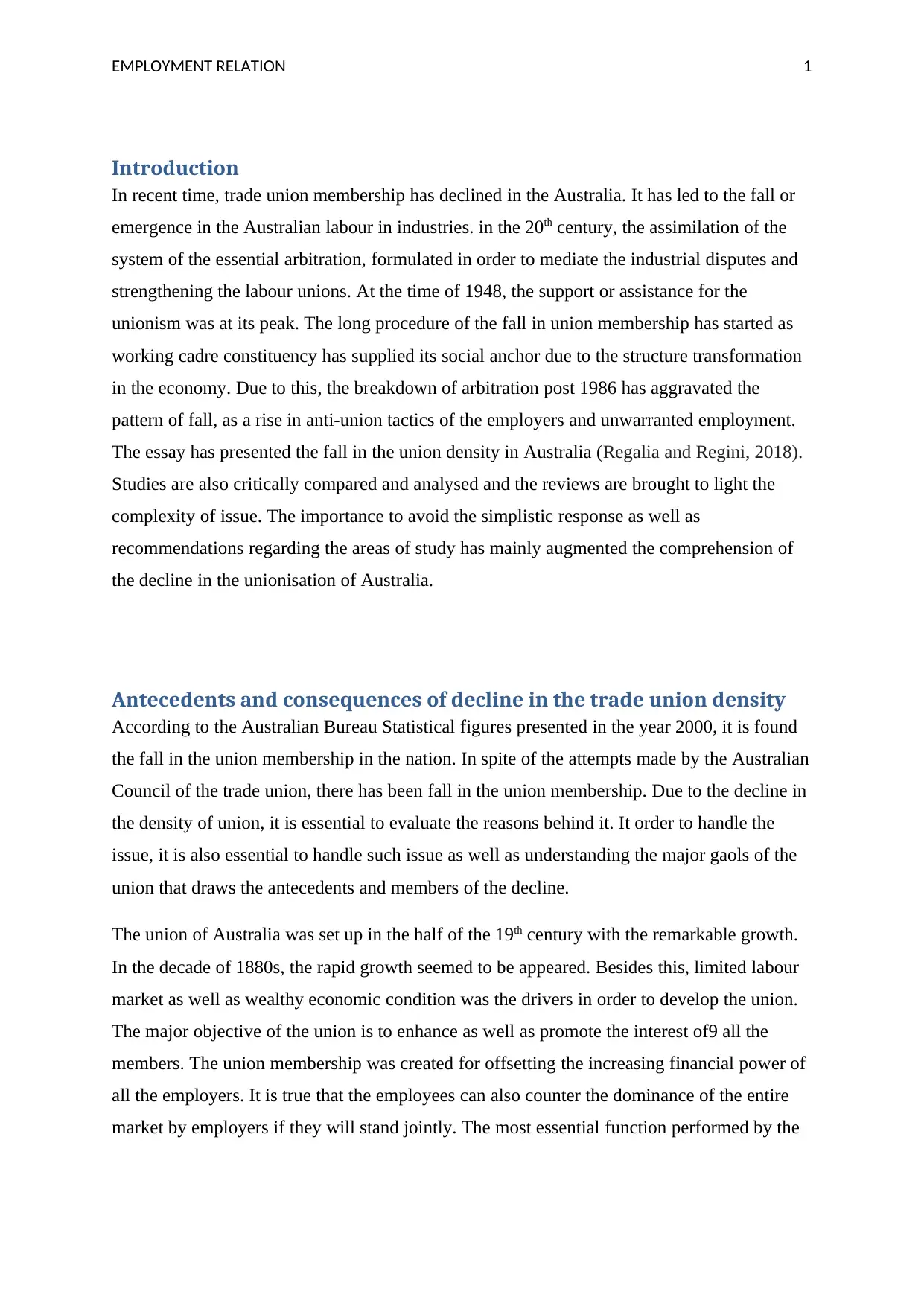
EMPLOYMENT RELATION 1
Introduction
In recent time, trade union membership has declined in the Australia. It has led to the fall or
emergence in the Australian labour in industries. in the 20th century, the assimilation of the
system of the essential arbitration, formulated in order to mediate the industrial disputes and
strengthening the labour unions. At the time of 1948, the support or assistance for the
unionism was at its peak. The long procedure of the fall in union membership has started as
working cadre constituency has supplied its social anchor due to the structure transformation
in the economy. Due to this, the breakdown of arbitration post 1986 has aggravated the
pattern of fall, as a rise in anti-union tactics of the employers and unwarranted employment.
The essay has presented the fall in the union density in Australia (Regalia and Regini, 2018).
Studies are also critically compared and analysed and the reviews are brought to light the
complexity of issue. The importance to avoid the simplistic response as well as
recommendations regarding the areas of study has mainly augmented the comprehension of
the decline in the unionisation of Australia.
Antecedents and consequences of decline in the trade union density
According to the Australian Bureau Statistical figures presented in the year 2000, it is found
the fall in the union membership in the nation. In spite of the attempts made by the Australian
Council of the trade union, there has been fall in the union membership. Due to the decline in
the density of union, it is essential to evaluate the reasons behind it. It order to handle the
issue, it is also essential to handle such issue as well as understanding the major gaols of the
union that draws the antecedents and members of the decline.
The union of Australia was set up in the half of the 19th century with the remarkable growth.
In the decade of 1880s, the rapid growth seemed to be appeared. Besides this, limited labour
market as well as wealthy economic condition was the drivers in order to develop the union.
The major objective of the union is to enhance as well as promote the interest of9 all the
members. The union membership was created for offsetting the increasing financial power of
all the employers. It is true that the employees can also counter the dominance of the entire
market by employers if they will stand jointly. The most essential function performed by the
Introduction
In recent time, trade union membership has declined in the Australia. It has led to the fall or
emergence in the Australian labour in industries. in the 20th century, the assimilation of the
system of the essential arbitration, formulated in order to mediate the industrial disputes and
strengthening the labour unions. At the time of 1948, the support or assistance for the
unionism was at its peak. The long procedure of the fall in union membership has started as
working cadre constituency has supplied its social anchor due to the structure transformation
in the economy. Due to this, the breakdown of arbitration post 1986 has aggravated the
pattern of fall, as a rise in anti-union tactics of the employers and unwarranted employment.
The essay has presented the fall in the union density in Australia (Regalia and Regini, 2018).
Studies are also critically compared and analysed and the reviews are brought to light the
complexity of issue. The importance to avoid the simplistic response as well as
recommendations regarding the areas of study has mainly augmented the comprehension of
the decline in the unionisation of Australia.
Antecedents and consequences of decline in the trade union density
According to the Australian Bureau Statistical figures presented in the year 2000, it is found
the fall in the union membership in the nation. In spite of the attempts made by the Australian
Council of the trade union, there has been fall in the union membership. Due to the decline in
the density of union, it is essential to evaluate the reasons behind it. It order to handle the
issue, it is also essential to handle such issue as well as understanding the major gaols of the
union that draws the antecedents and members of the decline.
The union of Australia was set up in the half of the 19th century with the remarkable growth.
In the decade of 1880s, the rapid growth seemed to be appeared. Besides this, limited labour
market as well as wealthy economic condition was the drivers in order to develop the union.
The major objective of the union is to enhance as well as promote the interest of9 all the
members. The union membership was created for offsetting the increasing financial power of
all the employers. It is true that the employees can also counter the dominance of the entire
market by employers if they will stand jointly. The most essential function performed by the
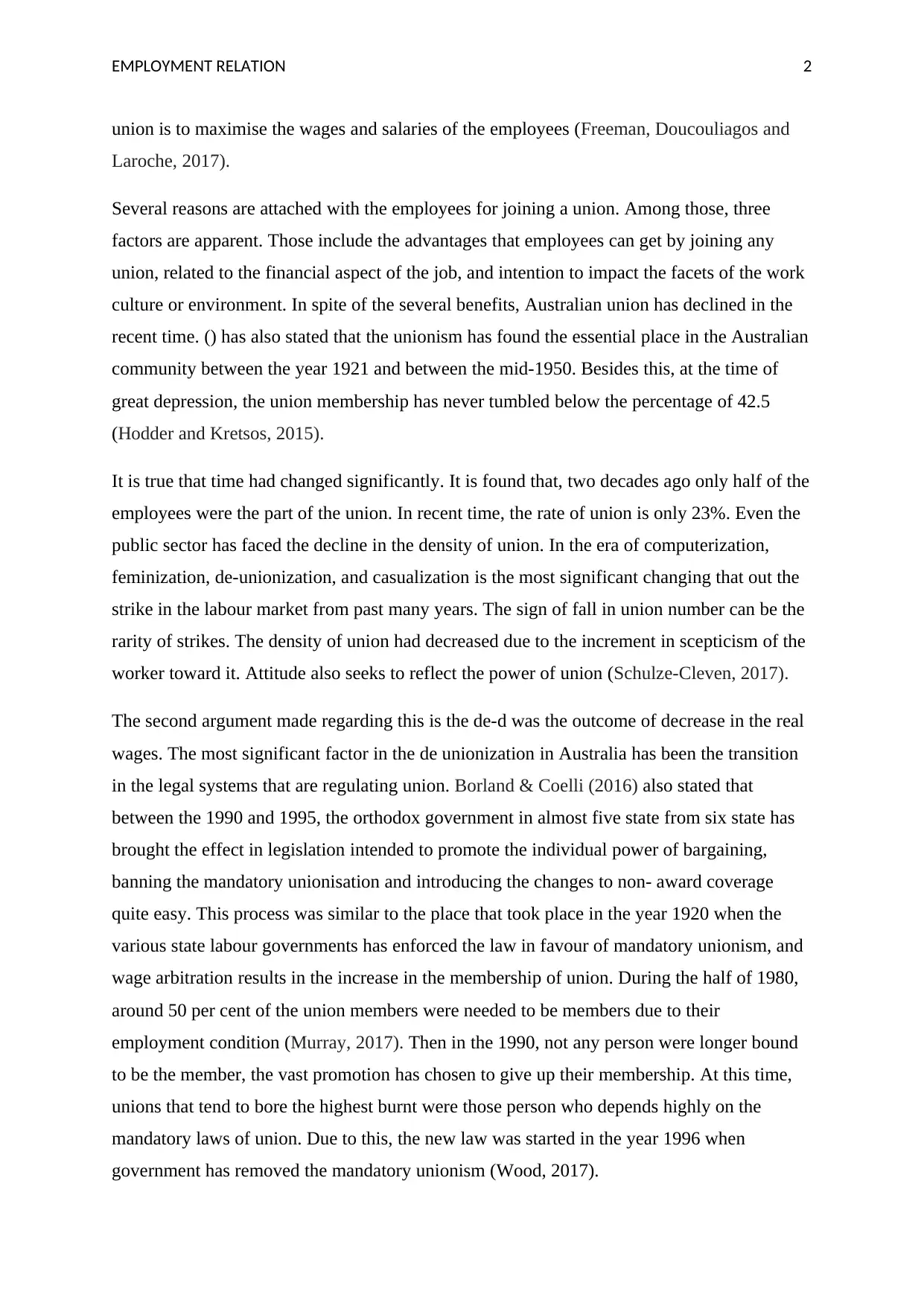
EMPLOYMENT RELATION 2
union is to maximise the wages and salaries of the employees (Freeman, Doucouliagos and
Laroche, 2017).
Several reasons are attached with the employees for joining a union. Among those, three
factors are apparent. Those include the advantages that employees can get by joining any
union, related to the financial aspect of the job, and intention to impact the facets of the work
culture or environment. In spite of the several benefits, Australian union has declined in the
recent time. () has also stated that the unionism has found the essential place in the Australian
community between the year 1921 and between the mid-1950. Besides this, at the time of
great depression, the union membership has never tumbled below the percentage of 42.5
(Hodder and Kretsos, 2015).
It is true that time had changed significantly. It is found that, two decades ago only half of the
employees were the part of the union. In recent time, the rate of union is only 23%. Even the
public sector has faced the decline in the density of union. In the era of computerization,
feminization, de-unionization, and casualization is the most significant changing that out the
strike in the labour market from past many years. The sign of fall in union number can be the
rarity of strikes. The density of union had decreased due to the increment in scepticism of the
worker toward it. Attitude also seeks to reflect the power of union (Schulze-Cleven, 2017).
The second argument made regarding this is the de-d was the outcome of decrease in the real
wages. The most significant factor in the de unionization in Australia has been the transition
in the legal systems that are regulating union. Borland & Coelli (2016) also stated that
between the 1990 and 1995, the orthodox government in almost five state from six state has
brought the effect in legislation intended to promote the individual power of bargaining,
banning the mandatory unionisation and introducing the changes to non- award coverage
quite easy. This process was similar to the place that took place in the year 1920 when the
various state labour governments has enforced the law in favour of mandatory unionism, and
wage arbitration results in the increase in the membership of union. During the half of 1980,
around 50 per cent of the union members were needed to be members due to their
employment condition (Murray, 2017). Then in the 1990, not any person were longer bound
to be the member, the vast promotion has chosen to give up their membership. At this time,
unions that tend to bore the highest burnt were those person who depends highly on the
mandatory laws of union. Due to this, the new law was started in the year 1996 when
government has removed the mandatory unionism (Wood, 2017).
union is to maximise the wages and salaries of the employees (Freeman, Doucouliagos and
Laroche, 2017).
Several reasons are attached with the employees for joining a union. Among those, three
factors are apparent. Those include the advantages that employees can get by joining any
union, related to the financial aspect of the job, and intention to impact the facets of the work
culture or environment. In spite of the several benefits, Australian union has declined in the
recent time. () has also stated that the unionism has found the essential place in the Australian
community between the year 1921 and between the mid-1950. Besides this, at the time of
great depression, the union membership has never tumbled below the percentage of 42.5
(Hodder and Kretsos, 2015).
It is true that time had changed significantly. It is found that, two decades ago only half of the
employees were the part of the union. In recent time, the rate of union is only 23%. Even the
public sector has faced the decline in the density of union. In the era of computerization,
feminization, de-unionization, and casualization is the most significant changing that out the
strike in the labour market from past many years. The sign of fall in union number can be the
rarity of strikes. The density of union had decreased due to the increment in scepticism of the
worker toward it. Attitude also seeks to reflect the power of union (Schulze-Cleven, 2017).
The second argument made regarding this is the de-d was the outcome of decrease in the real
wages. The most significant factor in the de unionization in Australia has been the transition
in the legal systems that are regulating union. Borland & Coelli (2016) also stated that
between the 1990 and 1995, the orthodox government in almost five state from six state has
brought the effect in legislation intended to promote the individual power of bargaining,
banning the mandatory unionisation and introducing the changes to non- award coverage
quite easy. This process was similar to the place that took place in the year 1920 when the
various state labour governments has enforced the law in favour of mandatory unionism, and
wage arbitration results in the increase in the membership of union. During the half of 1980,
around 50 per cent of the union members were needed to be members due to their
employment condition (Murray, 2017). Then in the 1990, not any person were longer bound
to be the member, the vast promotion has chosen to give up their membership. At this time,
unions that tend to bore the highest burnt were those person who depends highly on the
mandatory laws of union. Due to this, the new law was started in the year 1996 when
government has removed the mandatory unionism (Wood, 2017).
⊘ This is a preview!⊘
Do you want full access?
Subscribe today to unlock all pages.

Trusted by 1+ million students worldwide
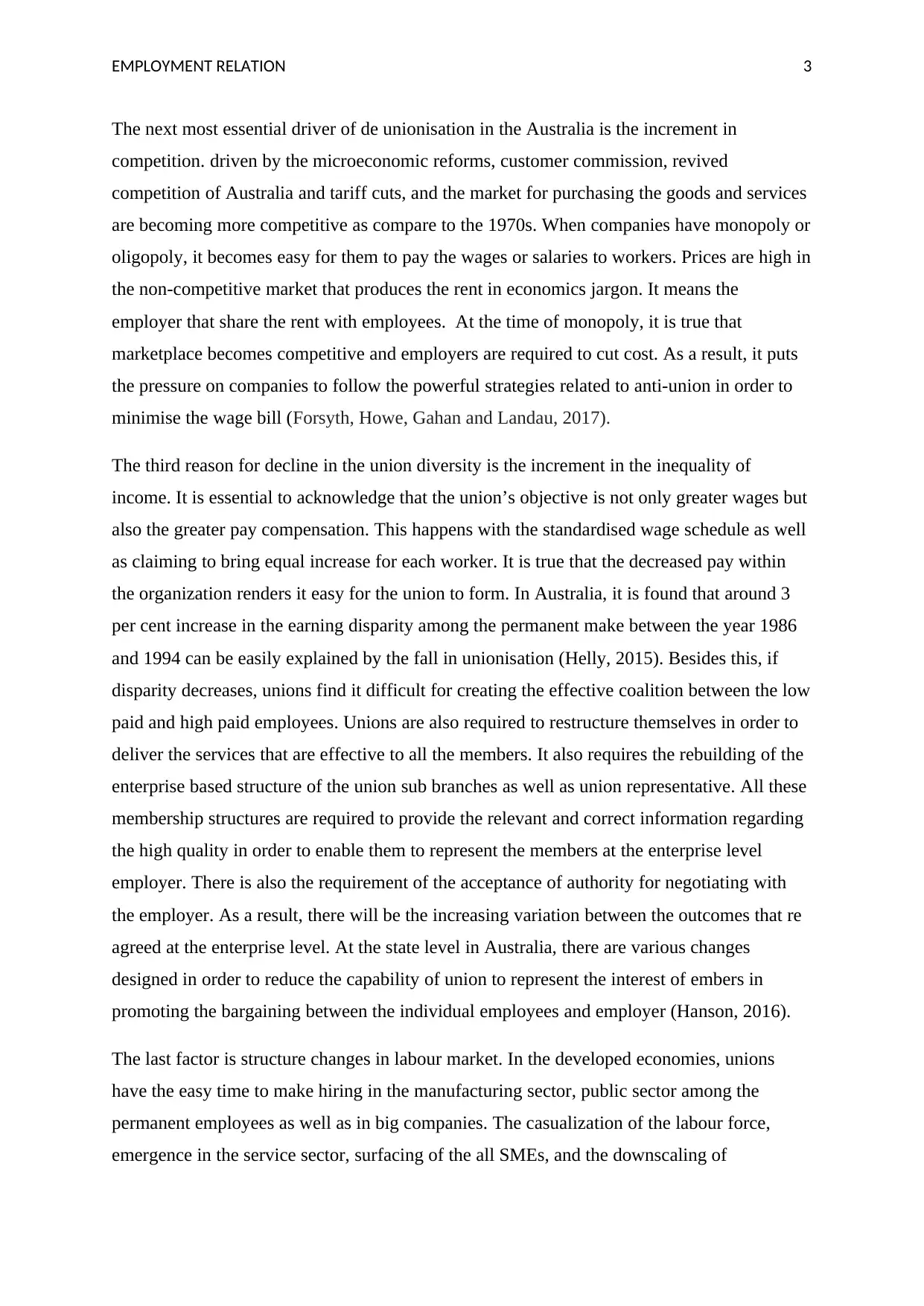
EMPLOYMENT RELATION 3
The next most essential driver of de unionisation in the Australia is the increment in
competition. driven by the microeconomic reforms, customer commission, revived
competition of Australia and tariff cuts, and the market for purchasing the goods and services
are becoming more competitive as compare to the 1970s. When companies have monopoly or
oligopoly, it becomes easy for them to pay the wages or salaries to workers. Prices are high in
the non-competitive market that produces the rent in economics jargon. It means the
employer that share the rent with employees. At the time of monopoly, it is true that
marketplace becomes competitive and employers are required to cut cost. As a result, it puts
the pressure on companies to follow the powerful strategies related to anti-union in order to
minimise the wage bill (Forsyth, Howe, Gahan and Landau, 2017).
The third reason for decline in the union diversity is the increment in the inequality of
income. It is essential to acknowledge that the union’s objective is not only greater wages but
also the greater pay compensation. This happens with the standardised wage schedule as well
as claiming to bring equal increase for each worker. It is true that the decreased pay within
the organization renders it easy for the union to form. In Australia, it is found that around 3
per cent increase in the earning disparity among the permanent make between the year 1986
and 1994 can be easily explained by the fall in unionisation (Helly, 2015). Besides this, if
disparity decreases, unions find it difficult for creating the effective coalition between the low
paid and high paid employees. Unions are also required to restructure themselves in order to
deliver the services that are effective to all the members. It also requires the rebuilding of the
enterprise based structure of the union sub branches as well as union representative. All these
membership structures are required to provide the relevant and correct information regarding
the high quality in order to enable them to represent the members at the enterprise level
employer. There is also the requirement of the acceptance of authority for negotiating with
the employer. As a result, there will be the increasing variation between the outcomes that re
agreed at the enterprise level. At the state level in Australia, there are various changes
designed in order to reduce the capability of union to represent the interest of embers in
promoting the bargaining between the individual employees and employer (Hanson, 2016).
The last factor is structure changes in labour market. In the developed economies, unions
have the easy time to make hiring in the manufacturing sector, public sector among the
permanent employees as well as in big companies. The casualization of the labour force,
emergence in the service sector, surfacing of the all SMEs, and the downscaling of
The next most essential driver of de unionisation in the Australia is the increment in
competition. driven by the microeconomic reforms, customer commission, revived
competition of Australia and tariff cuts, and the market for purchasing the goods and services
are becoming more competitive as compare to the 1970s. When companies have monopoly or
oligopoly, it becomes easy for them to pay the wages or salaries to workers. Prices are high in
the non-competitive market that produces the rent in economics jargon. It means the
employer that share the rent with employees. At the time of monopoly, it is true that
marketplace becomes competitive and employers are required to cut cost. As a result, it puts
the pressure on companies to follow the powerful strategies related to anti-union in order to
minimise the wage bill (Forsyth, Howe, Gahan and Landau, 2017).
The third reason for decline in the union diversity is the increment in the inequality of
income. It is essential to acknowledge that the union’s objective is not only greater wages but
also the greater pay compensation. This happens with the standardised wage schedule as well
as claiming to bring equal increase for each worker. It is true that the decreased pay within
the organization renders it easy for the union to form. In Australia, it is found that around 3
per cent increase in the earning disparity among the permanent make between the year 1986
and 1994 can be easily explained by the fall in unionisation (Helly, 2015). Besides this, if
disparity decreases, unions find it difficult for creating the effective coalition between the low
paid and high paid employees. Unions are also required to restructure themselves in order to
deliver the services that are effective to all the members. It also requires the rebuilding of the
enterprise based structure of the union sub branches as well as union representative. All these
membership structures are required to provide the relevant and correct information regarding
the high quality in order to enable them to represent the members at the enterprise level
employer. There is also the requirement of the acceptance of authority for negotiating with
the employer. As a result, there will be the increasing variation between the outcomes that re
agreed at the enterprise level. At the state level in Australia, there are various changes
designed in order to reduce the capability of union to represent the interest of embers in
promoting the bargaining between the individual employees and employer (Hanson, 2016).
The last factor is structure changes in labour market. In the developed economies, unions
have the easy time to make hiring in the manufacturing sector, public sector among the
permanent employees as well as in big companies. The casualization of the labour force,
emergence in the service sector, surfacing of the all SMEs, and the downscaling of
Paraphrase This Document
Need a fresh take? Get an instant paraphrase of this document with our AI Paraphraser
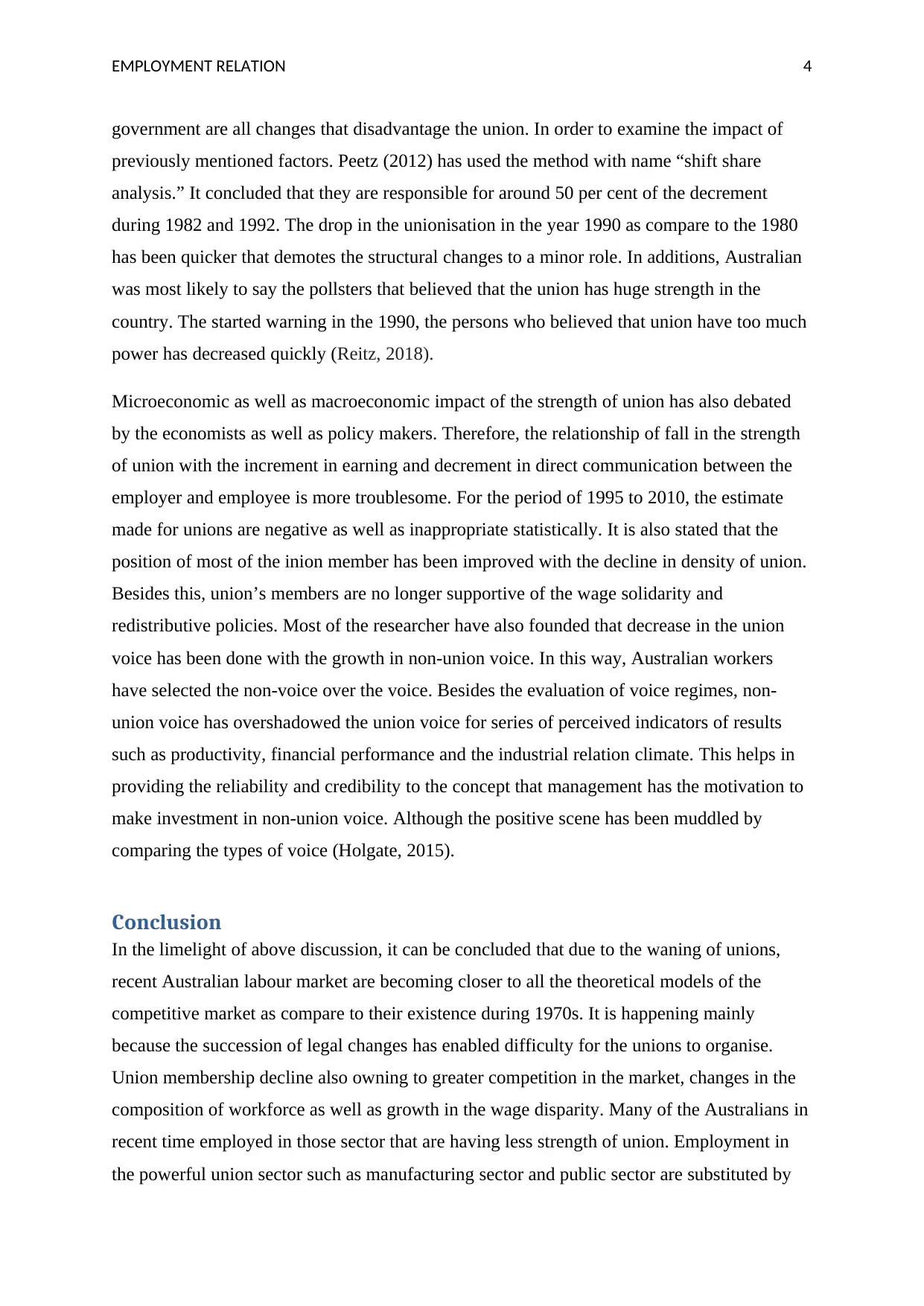
EMPLOYMENT RELATION 4
government are all changes that disadvantage the union. In order to examine the impact of
previously mentioned factors. Peetz (2012) has used the method with name “shift share
analysis.” It concluded that they are responsible for around 50 per cent of the decrement
during 1982 and 1992. The drop in the unionisation in the year 1990 as compare to the 1980
has been quicker that demotes the structural changes to a minor role. In additions, Australian
was most likely to say the pollsters that believed that the union has huge strength in the
country. The started warning in the 1990, the persons who believed that union have too much
power has decreased quickly (Reitz, 2018).
Microeconomic as well as macroeconomic impact of the strength of union has also debated
by the economists as well as policy makers. Therefore, the relationship of fall in the strength
of union with the increment in earning and decrement in direct communication between the
employer and employee is more troublesome. For the period of 1995 to 2010, the estimate
made for unions are negative as well as inappropriate statistically. It is also stated that the
position of most of the inion member has been improved with the decline in density of union.
Besides this, union’s members are no longer supportive of the wage solidarity and
redistributive policies. Most of the researcher have also founded that decrease in the union
voice has been done with the growth in non-union voice. In this way, Australian workers
have selected the non-voice over the voice. Besides the evaluation of voice regimes, non-
union voice has overshadowed the union voice for series of perceived indicators of results
such as productivity, financial performance and the industrial relation climate. This helps in
providing the reliability and credibility to the concept that management has the motivation to
make investment in non-union voice. Although the positive scene has been muddled by
comparing the types of voice (Holgate, 2015).
Conclusion
In the limelight of above discussion, it can be concluded that due to the waning of unions,
recent Australian labour market are becoming closer to all the theoretical models of the
competitive market as compare to their existence during 1970s. It is happening mainly
because the succession of legal changes has enabled difficulty for the unions to organise.
Union membership decline also owning to greater competition in the market, changes in the
composition of workforce as well as growth in the wage disparity. Many of the Australians in
recent time employed in those sector that are having less strength of union. Employment in
the powerful union sector such as manufacturing sector and public sector are substituted by
government are all changes that disadvantage the union. In order to examine the impact of
previously mentioned factors. Peetz (2012) has used the method with name “shift share
analysis.” It concluded that they are responsible for around 50 per cent of the decrement
during 1982 and 1992. The drop in the unionisation in the year 1990 as compare to the 1980
has been quicker that demotes the structural changes to a minor role. In additions, Australian
was most likely to say the pollsters that believed that the union has huge strength in the
country. The started warning in the 1990, the persons who believed that union have too much
power has decreased quickly (Reitz, 2018).
Microeconomic as well as macroeconomic impact of the strength of union has also debated
by the economists as well as policy makers. Therefore, the relationship of fall in the strength
of union with the increment in earning and decrement in direct communication between the
employer and employee is more troublesome. For the period of 1995 to 2010, the estimate
made for unions are negative as well as inappropriate statistically. It is also stated that the
position of most of the inion member has been improved with the decline in density of union.
Besides this, union’s members are no longer supportive of the wage solidarity and
redistributive policies. Most of the researcher have also founded that decrease in the union
voice has been done with the growth in non-union voice. In this way, Australian workers
have selected the non-voice over the voice. Besides the evaluation of voice regimes, non-
union voice has overshadowed the union voice for series of perceived indicators of results
such as productivity, financial performance and the industrial relation climate. This helps in
providing the reliability and credibility to the concept that management has the motivation to
make investment in non-union voice. Although the positive scene has been muddled by
comparing the types of voice (Holgate, 2015).
Conclusion
In the limelight of above discussion, it can be concluded that due to the waning of unions,
recent Australian labour market are becoming closer to all the theoretical models of the
competitive market as compare to their existence during 1970s. It is happening mainly
because the succession of legal changes has enabled difficulty for the unions to organise.
Union membership decline also owning to greater competition in the market, changes in the
composition of workforce as well as growth in the wage disparity. Many of the Australians in
recent time employed in those sector that are having less strength of union. Employment in
the powerful union sector such as manufacturing sector and public sector are substituted by
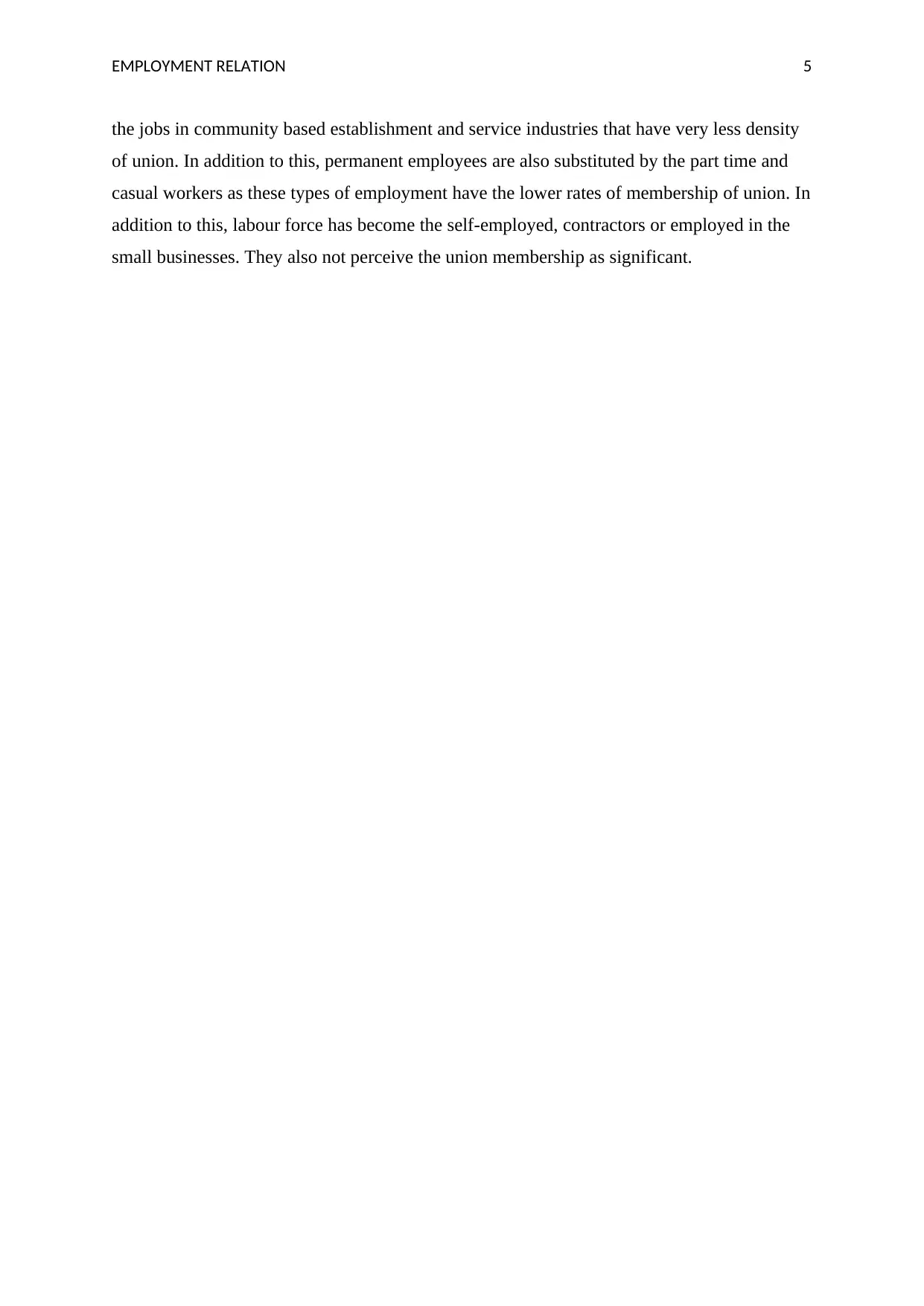
EMPLOYMENT RELATION 5
the jobs in community based establishment and service industries that have very less density
of union. In addition to this, permanent employees are also substituted by the part time and
casual workers as these types of employment have the lower rates of membership of union. In
addition to this, labour force has become the self-employed, contractors or employed in the
small businesses. They also not perceive the union membership as significant.
the jobs in community based establishment and service industries that have very less density
of union. In addition to this, permanent employees are also substituted by the part time and
casual workers as these types of employment have the lower rates of membership of union. In
addition to this, labour force has become the self-employed, contractors or employed in the
small businesses. They also not perceive the union membership as significant.
⊘ This is a preview!⊘
Do you want full access?
Subscribe today to unlock all pages.

Trusted by 1+ million students worldwide
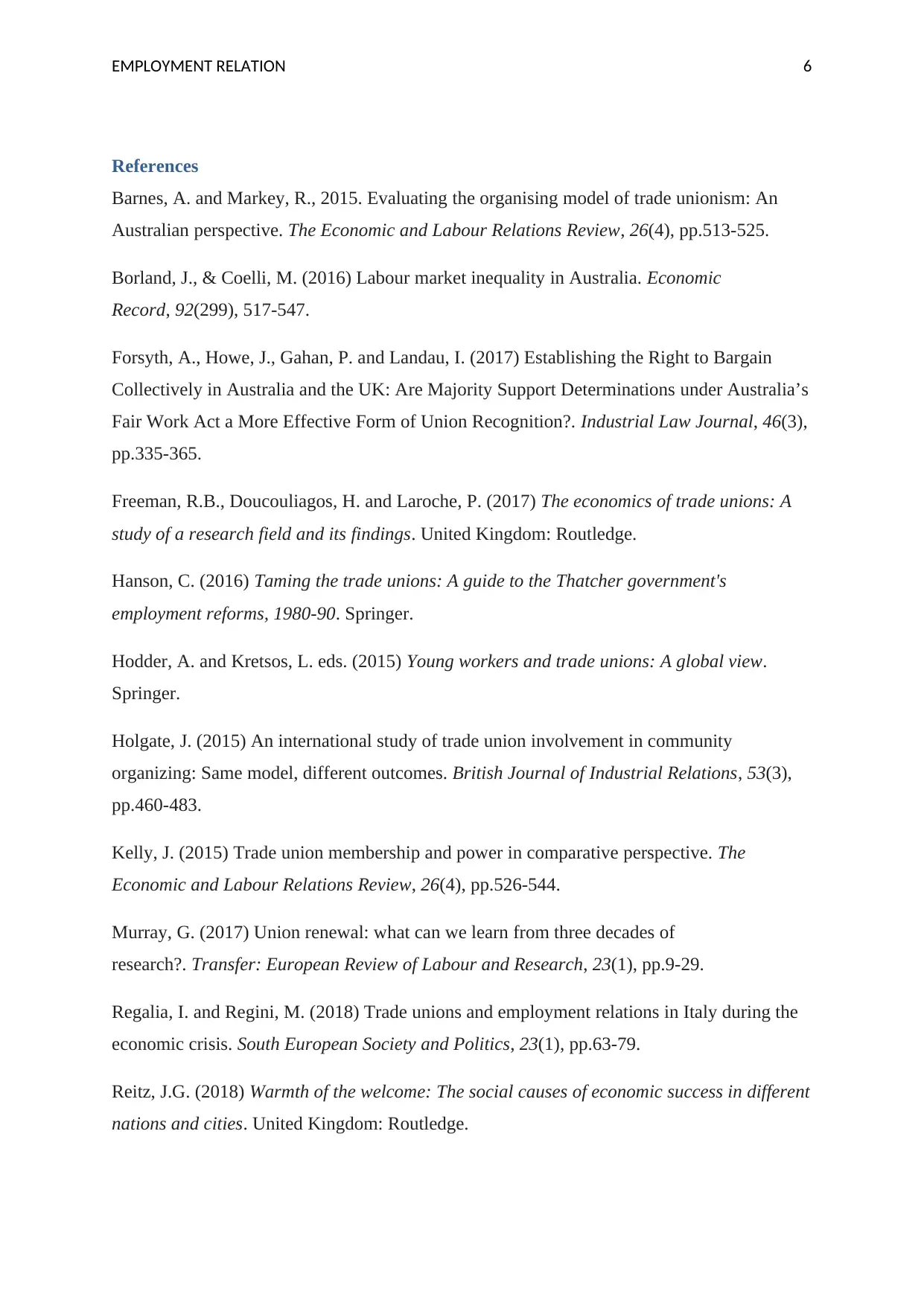
EMPLOYMENT RELATION 6
References
Barnes, A. and Markey, R., 2015. Evaluating the organising model of trade unionism: An
Australian perspective. The Economic and Labour Relations Review, 26(4), pp.513-525.
Borland, J., & Coelli, M. (2016) Labour market inequality in Australia. Economic
Record, 92(299), 517-547.
Forsyth, A., Howe, J., Gahan, P. and Landau, I. (2017) Establishing the Right to Bargain
Collectively in Australia and the UK: Are Majority Support Determinations under Australia’s
Fair Work Act a More Effective Form of Union Recognition?. Industrial Law Journal, 46(3),
pp.335-365.
Freeman, R.B., Doucouliagos, H. and Laroche, P. (2017) The economics of trade unions: A
study of a research field and its findings. United Kingdom: Routledge.
Hanson, C. (2016) Taming the trade unions: A guide to the Thatcher government's
employment reforms, 1980-90. Springer.
Hodder, A. and Kretsos, L. eds. (2015) Young workers and trade unions: A global view.
Springer.
Holgate, J. (2015) An international study of trade union involvement in community
organizing: Same model, different outcomes. British Journal of Industrial Relations, 53(3),
pp.460-483.
Kelly, J. (2015) Trade union membership and power in comparative perspective. The
Economic and Labour Relations Review, 26(4), pp.526-544.
Murray, G. (2017) Union renewal: what can we learn from three decades of
research?. Transfer: European Review of Labour and Research, 23(1), pp.9-29.
Regalia, I. and Regini, M. (2018) Trade unions and employment relations in Italy during the
economic crisis. South European Society and Politics, 23(1), pp.63-79.
Reitz, J.G. (2018) Warmth of the welcome: The social causes of economic success in different
nations and cities. United Kingdom: Routledge.
References
Barnes, A. and Markey, R., 2015. Evaluating the organising model of trade unionism: An
Australian perspective. The Economic and Labour Relations Review, 26(4), pp.513-525.
Borland, J., & Coelli, M. (2016) Labour market inequality in Australia. Economic
Record, 92(299), 517-547.
Forsyth, A., Howe, J., Gahan, P. and Landau, I. (2017) Establishing the Right to Bargain
Collectively in Australia and the UK: Are Majority Support Determinations under Australia’s
Fair Work Act a More Effective Form of Union Recognition?. Industrial Law Journal, 46(3),
pp.335-365.
Freeman, R.B., Doucouliagos, H. and Laroche, P. (2017) The economics of trade unions: A
study of a research field and its findings. United Kingdom: Routledge.
Hanson, C. (2016) Taming the trade unions: A guide to the Thatcher government's
employment reforms, 1980-90. Springer.
Hodder, A. and Kretsos, L. eds. (2015) Young workers and trade unions: A global view.
Springer.
Holgate, J. (2015) An international study of trade union involvement in community
organizing: Same model, different outcomes. British Journal of Industrial Relations, 53(3),
pp.460-483.
Kelly, J. (2015) Trade union membership and power in comparative perspective. The
Economic and Labour Relations Review, 26(4), pp.526-544.
Murray, G. (2017) Union renewal: what can we learn from three decades of
research?. Transfer: European Review of Labour and Research, 23(1), pp.9-29.
Regalia, I. and Regini, M. (2018) Trade unions and employment relations in Italy during the
economic crisis. South European Society and Politics, 23(1), pp.63-79.
Reitz, J.G. (2018) Warmth of the welcome: The social causes of economic success in different
nations and cities. United Kingdom: Routledge.
Paraphrase This Document
Need a fresh take? Get an instant paraphrase of this document with our AI Paraphraser

EMPLOYMENT RELATION 7
Schulze-Cleven, T. (2017) Collective action and globalization: Building and mobilizing
labour power. Journal of Industrial Relations, 59(4), pp.397-419.
Wood, G. (2017) Trade unions and democracy: strategies and perspectives. United
Kingdom: Routledge.
Schulze-Cleven, T. (2017) Collective action and globalization: Building and mobilizing
labour power. Journal of Industrial Relations, 59(4), pp.397-419.
Wood, G. (2017) Trade unions and democracy: strategies and perspectives. United
Kingdom: Routledge.
1 out of 8
Related Documents
Your All-in-One AI-Powered Toolkit for Academic Success.
+13062052269
info@desklib.com
Available 24*7 on WhatsApp / Email
![[object Object]](/_next/static/media/star-bottom.7253800d.svg)
Unlock your academic potential
Copyright © 2020–2026 A2Z Services. All Rights Reserved. Developed and managed by ZUCOL.




